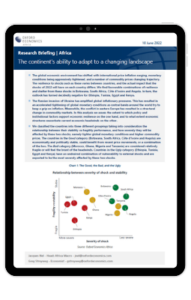Africa’s ability to adapt to a changing landscape
 The global economic environment has shifted with international price inflation surging, monetary conditions being aggressively tightened, and a number of commodity prices changing trajectory. The resilience to shocks such as these varies between countries, and the actual impact that the shocks of 2022 will have on each country differs. We find favourable combinations of resilience and shelter from these shocks in Botswana, South Africa, Côte d’Ivoire and Angola. In turn, the outlook has turned decidedly negative for Ethiopia, Tunisia, Egypt and Kenya.
The global economic environment has shifted with international price inflation surging, monetary conditions being aggressively tightened, and a number of commodity prices changing trajectory. The resilience to shocks such as these varies between countries, and the actual impact that the shocks of 2022 will have on each country differs. We find favourable combinations of resilience and shelter from these shocks in Botswana, South Africa, Côte d’Ivoire and Angola. In turn, the outlook has turned decidedly negative for Ethiopia, Tunisia, Egypt and Kenya.
What you will learn:
- We assess the extent to which policy and institutional factors support economic resilience and to what extent economic structures exacerbate current economic headwinds.
- The relationship between countries’ stability vs fragility performance and how severely they will be affected by tighter global monetary conditions and higher commodity prices.
- Countries such as Ethiopia, Tunisia, Egypt and Kenya have an undesired combination of vulnerability to external shocks and are expected to be the most severely affected by these two shocks.
Tags:
Related Services

Service
Africa Forecasting Service
Comprehensive analysis of immediate and long-term economic and political prospects to inform investment strategies, expansion and African operations through forecasts and commentary by country, industry, and city.
Find Out More
Service
Global Industry Service
Gain insights into the impact of economic developments on industrial sectors.
Find Out More

Service
MENA Forecasting Service
Monitor the implications of economic and market developments in the MENA region.
Find Out More